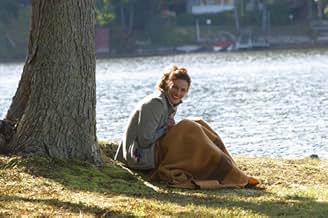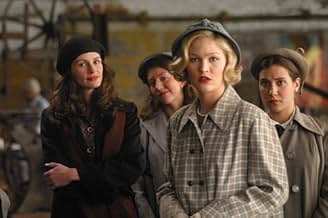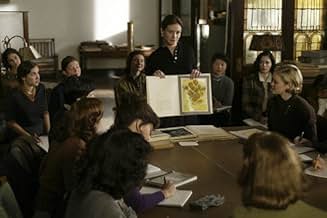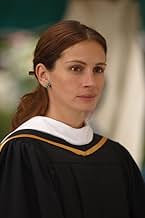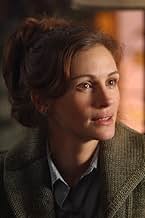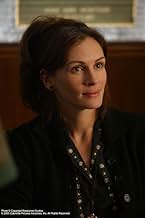Una docente libera pensatrice di storia dell'arte insegna alle ragazze conservatrici di Wellesley degli anni cinquanta a mettere in discussione i propri ruoli tradizionali all'interno della ... Leggi tuttoUna docente libera pensatrice di storia dell'arte insegna alle ragazze conservatrici di Wellesley degli anni cinquanta a mettere in discussione i propri ruoli tradizionali all'interno della società.Una docente libera pensatrice di storia dell'arte insegna alle ragazze conservatrici di Wellesley degli anni cinquanta a mettere in discussione i propri ruoli tradizionali all'interno della società.
- Regia
- Sceneggiatura
- Star
- Premi
- 6 candidature totali
Recensioni in evidenza
Well, I had that feeling indeed. It felt like Dead Poet's Society during some periods in the movie. But overall, it was still different. The surface story isn't that complicated and easy to follow. It's nothing new either. But it was displayed very well.
Sure, it's about a teacher... her passion to teach and the way she outwitted the students to get the best out of them... It also shows the way a good teacher cares for their students and so forth... and the way contradicting ideas may blind one's ideas and actions, towards those who they are meant for. Did that sentence sound weird or what? :).
You can't go wrong with the cast here. You've got Julia Roberts, Kirsten Dunst, Julia Stiles, Maggie Gyllenhaal, Ginnefer Goodwin, etc. They played great in the movie.
Julia Roberts is just great at playing these emotional roles. It was believable as well. I at least could feel the frustration which she had. Her character is more of a confused type. She reminded me of Michelle Pfeiffer in Dangerous Minds... There was basically a mixture of confusion and dedication... thus as a teacher, despite how sure of she may be of her teaching methods, you also sense a nervousness in her... a feeling of uncertainty as to whether her methods of getting the messages across to the students or not will work. I thought Julia Roberts did a great job in that area.
Kirsten was just excellent. You could feel the internal turmoil going through her throughout the movie. One might argue that she had a pretty wack role and that she overacted etc. but I don't agree with that. She's practically a heartless b**** through the movie, but you can't help but understand why. The same goes for Julia and Maggie. Just the way they were depicted in the movie, you really felt for them. Ginnefer Goodwin's character was also funny and emotional to watch.
Marcia Gay Harden, as Julia's friend was great. She was a pretty funny character to watch, but at the same time, you just can't help but feel sorry for her.
Times have changed... from those times and now. Many might watch this movie and go, "Uhm, okay, what's the big deal?" But the problem is that women have gone through a great ordeal and struggle to get to where they are today in society. Even today, they still fight to gain respect in many areas in the world today.
I've heard many bad comments about this movie. And funnily enough, most of them come from guys... whilst the females found it a bit better. There were some negative comments but many said that they loved it, but felt that it wasn't a movie for everyone.
The movie tackling the issue of feminism only touches upon a small part of it all of course. One cannot tackle the whole aspect of feminism in any one single movie at all, and I found the focus to be good enough. There are many stereotypes here and I found them necessary to get the points across. If it were not for the stereotypes, people would be wondering what the point really was. But now that there are stereotypes, people will complain about them.
I thought that it was a bit too short. It could have focused a bit more on the other characters in the movie... i.e. the girls in school. A few more subplots and build ups may have been better. There was a little foreshadowing in the movie but one couldn't help but wonder where the movie was going. But what overcame this, from my point of view, was that you just felt that you wanted to get to know the characters in the movie more. The more you knew about each character, the more the characters knew about one another. I thought that was quite nice.
I would advise everyone with an open mind for dramas to go watch this movie. If guys see this movie as a "chick flick"... they really won't know what to expect cause this would be "the most THE chick flick for chicks" if you get my drift. I'm a guy and I found it entertaining... Whether it was insightful or not, I wouldn't say it was, due to experiences and stories throughout my life.
The movie isn't without flaws... There could have been even more character build up if only the director's were given more film to record the picture. But do watch this if you can :). It'll be worth the time, if you're patient enough :).
But the film does not focus only on the revolutionary teacher, but on a group of four friends who are so different that at times their relationships are not the happiest. We can follow the trajectories of some of these students. Betty Warren (Kirsten Dunst) initially adheres to society's traditional expectations and has a narrow view of the role of women at the time. She aspires to a conventional marriage and a traditional home life. However, as the story unfolds, Betty undergoes a transformation and begins to question her own beliefs and desires, thanks to Katherine's influence and the discoveries she makes about herself; Joan Brandwyn (Julia Stiles) is a talented and ambitious student at Wellesley who dreams of becoming a lawyer. She faces challenges as social and family expectations pressure her to marry and follow a more conventional path. Joan is inspired by Katherine's attitude and her quest for independence, which encourages her to follow her own dreams and challenge established conventions; Giselle Levy (Maggie Gyllenhaal) is an outgoing and daring student who openly defies social and academic norms. She is a rebellious figure, facing punishment and judgment for her "inappropriate" behavior. Giselle sees Katherine as a mentor and support figure who encourages her to embrace her authenticity and explore her non-standard interests; Connie Baker (Ginnifer Goodwin) is a shy and insecure young woman struggling to find her own voice. She is influenced by Katherine to overcome her lack of confidence and believe in her intellectual abilities. Throughout the film, Connie gains courage to voice her opinions and realizes her potential as a student and woman.
With the end of the War and the return of men to their "pre-established places" socially, a new campaign begins for women to return to their "place" in society, the home. But things weren't the same anymore and neither were women. Some wanted to continue working and already harbored ideas of independence, the speeches convincing them to return home and dedicate themselves to marriage were not efficient for all. For this reason, a campaign was started in favor of marriage and motherhood as a "true female vocation". Some more libertarian means of the media or women preached the possibility of reconciling marriage with a career, which for middle-class women, raised and educated in the best schools, seemed an insult. The 1950s, in addition to printing these discourses about a "feminine essence" focused on home and motherhood, which are against the remnants of the so-called "first wave" of feminism, which began in the 19th century and lasted until the beginning of the In the 20th century (according to some historians) the tensions that took place in that decade point to the perception of how the liberation discourses of women from patriarchy, on the one hand, and the moral appeal of institutions to their "submissive nature" on the other, make the "second wave" of feminism comes with new reflections and discourses for "women", such as their insertion in politics.
"Mona Lisa Smile" also touches on a variety of relevant and complex themes that reflect the society of the time and are still relevant today. Here are some of the main themes explored in the film: Role of Women in Society: A central theme of the film is the role of women in 1950s society. The story takes place in an all-female educational institution where traditional expectations for women were predominantly oriented toward marriage and motherhood. The film questions these social norms, featuring female characters who want more than just to fit these expectations, seeking their own identity and personal fulfillment; Education and Empowerment: The transformative power of education is a central theme in the film. Katherine Watson's character, as an art history professor, seeks to challenge and inspire her students to think critically, question established norms, and pursue a life of authenticity and purpose. Through knowledge and questioning, students are encouraged to find their own voices and become independent and empowered women.
The issue of Conformity and Rebellion is also addressed: The film explores the balance between social conformity and individual rebelliousness. The characters face the challenge of fitting into society's expectations, while at the same time wanting to follow their own paths. They must deal with the inner conflict between the desire to conform and the need to express their individuality and follow their own dreams; Sexuality and Freedom: The theme of sexuality is approached in a subtle but significant way in the film. Some characters question the idea that marriage is the only acceptable way to express female sexuality. They explore their own passions and desires, challenging society's conservative expectations and seeking a sexually satisfying and authentic life; Ambition and Autonomy: The film also explores the quest for personal ambition and women's struggle for autonomy and professional fulfillment. The characters face the dilemma of balancing their personal ambitions with social and family pressures. They face obstacles and challenges in pursuing their individual careers and desires, but find the strength and determination to persevere and fight for their own achievements.
At one point, while showing his second class, he puts on a work of art considered grotesque by one of the students. When questioned, she replies, "No, it's not! Is it not a good work? Hmm? Come on girls, there are no books telling you what to think, so it's not that easy, correct? Still in this dialogue, the student confronts the teacher, pointing out that "art is only art until the right people say it is". Excited by the challenging debate, the teacher responds: "And who are these people?". The scene described above is perhaps one of the best in the film with regard to the didactic aspects of the work. Another striking scene is in the section in which the students move to the studio to carry out a workshop with Van Gogh's works in boxes. The teacher talks about the possibility of popularizing art with the process of technical reproducibility.
In the technical aspects, what really deserves a special mention is Mike Newell's impeccable direction. He manages to give new life to a real story, which is the way women were seen. Anastas N. Michos' cinematography plays a key role in creating the film's atmosphere. Colors are carefully chosen to convey a sense of a specific era, with a cooler palette and muted tones, underscoring the melancholy, conservative atmosphere of the 1950s. Lighting is also used effectively to create contrast and emphasize the characters' emotions, as in the scenes where Katherine is teaching her students, where the light focuses on her, highlighting her presence and authority. The work of production and art direction, led by Jeannine Oppewall and Andrew M. Stearn, is exceptional. The sets and costumes are detailed and authentic, accurately recreating the environments of the era. Locations, such as Wellesley College and the interiors of the houses, are richly decorated and help to contextualize the story and characters. The production design contributes to the public's immersion in the portrayed period, with attention to the smallest details, from furniture to scene props.
The costumes created by Catherine Marie Thomas are elegant and accurately represent the style of the period. The female characters' clothing reflects the norms and expectations of 1950s society, with elegant dresses, skirts and classic hairstyles. The costumes also help convey the characters' transformations throughout the film, reflecting their internal changes and their search for authenticity. Mick Audsley's editing is deft in creating a fluid and coherent rhythm. The transition between scenes is smooth and the montage is well balanced, allowing the story to unfold cohesively. And Rachel Portman's score perfectly complements the film's emotional tone. Composed of delicate and melodic pieces, the music emphasizes the most emotional scenes and highlights the personal journey of the characters. The soundtrack contributes to the romantic and melancholy atmosphere of the film, accentuating the emotions and conflicts of the characters.
The film's maxim lies in the problem it addresses and the message it conveys, which were demonstrated with great care in all aspects; Dunst's character asks a good question, giving the example of the Mona Lisa, "she's smiling, but is she happy? ". In addition, we have a very exciting ending that runs away from any clichés. "Mona Lisa Smile" can be appreciated by all those who have the slightest interest in knowing what it was like at the time when only the male voice was heard, or who would like to appreciate good performances.
I don't share the many negative comments about this movie. It is a fine drama, one that merits repeat viewings once or twice a year. It is NOT simply a 'Dead Poet's Society' for the girls. To call it that is to overlook all the fine, unique points about this movie.
Update: Saw it again March 2013, I enjoyed it as much as the first two times.
Update: Saw it again June 2017, I enjoyed it as much as the first three times.
Despite these flaws, there is still a lot to recommend it. The film is very well made, with dazzling cinematography and picturesque scenery. And the costumes, hairstyles and makeup were beautiful. The music is lovely, very pleasant and soothing. Making the most of their rather stereotypical characters, the actors acquit themselves well. I admit it, I don't often care for Julia Roberts, but here she makes for a sympathetic lead as the unconventional art lecturer and does it more than adequately. Solidly supporting her as the students are Julia Stiles, Maggie Gyllanhaal and Kirsten Dunst especially. The film is ably directed too, and is emotionally manipulative, not in a bad way though. All in all, it is a very earnest and well made film, but as a drama it doesn't quite convince as much as it should've done. 7/10 Bethany Cox
Lo sapevi?
- QuizIn order to prepare for their roles, the leads were all put through a finishing school two weeks prior to filming. However, in contrast to the film's depiction, Wellesley College was never a finishing school. It was a private women's liberal arts college which emphasized social activism.
- BlooperAt the wedding, champagne is served in flute glasses. They were rarely used until the 1970s, when drier vintages became preferred. In the 1950s, champagne was served in champagne coupe (or saucer) glasses. They are still used in champagne fountains at weddings.
- Citazioni
Betty Warren: [Narrating] My teacher, Katherine Watson, lived by her own definition, and would not compromise that. Not even for *Wellesley*. I dedicate this, my last editorial, to an extraordinary woman who lived by example and compelled us all to see the world through new eyes. By the time you read this, she'll be sailing to Europe, where I know she'll find new walls to break down and new ideas to replace them with. I've heard her called a quitter for leaving, an aimless wanderer. But not all who wander are aimless, especially not those who seek truth beyond tradition, beyond definition, beyond the image.
- Curiosità sui creditiThe end credits for the prominent cast and crew are set in front of vintage footage and advertisements showing women in the 1940s and '50s.
- Colonne sonoreLift Thine Eyes
from "Elijah"
Written by Felix Mendelssohn
Performed by Wellesley College Chamber Singers
Lisa Graham Conductor
Under license from Wellesley College Chamber Singers
I più visti
Dettagli
- Data di uscita
- Paese di origine
- Siti ufficiali
- Lingue
- Celebre anche come
- La sonrisa de Mona Lisa
- Luoghi delle riprese
- Aziende produttrici
- Vedi altri crediti dell’azienda su IMDbPro
Botteghino
- Budget
- 65.000.000 USD (previsto)
- Lordo Stati Uniti e Canada
- 63.860.942 USD
- Fine settimana di apertura Stati Uniti e Canada
- 11.528.498 USD
- 21 dic 2003
- Lordo in tutto il mondo
- 141.337.989 USD
- Tempo di esecuzione1 ora 57 minuti
- Colore
- Mix di suoni
- Proporzioni
- 1.85 : 1
Contribuisci a questa pagina








